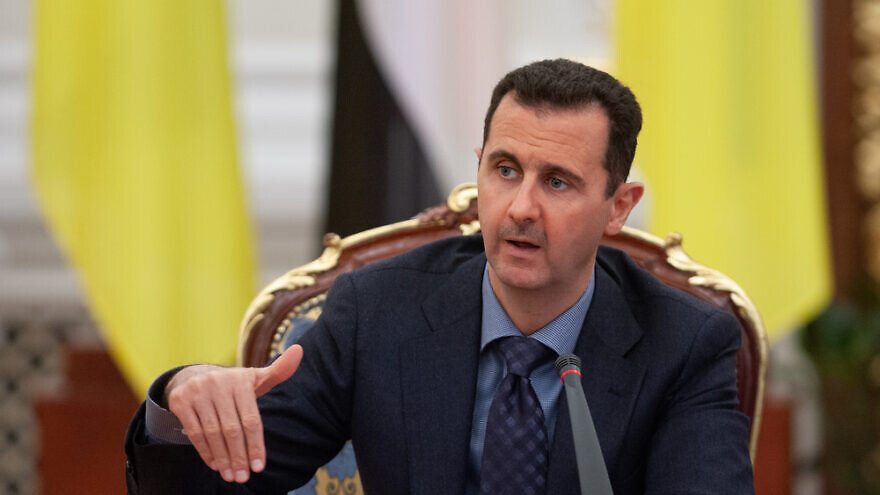Syria’s President Bashar Assad arrived in the United Arab Emirates on March 18 after the Gulf country’s rulers signaled a willingness to strengthen ties with Syria again. Assad’s visit marks a potential warming in Syria’s relations with its Arab neighbors, which had previously isolated him over Syria’s civil war, which began in March 2011 and has resulted in more than half of Syria’s pre-war population of 22 million having fled their homes and more than 500,000 people dead.
Friday’s visit was Assad’s first to an Arab state since the Syrian war began in 2011. Assad has traveled outside Syria only a few times during the war, only making official visits to Russia and Iran.
This outreach “derives from the notion that a rehabilitated Assad can form a part of an effort to block Iranian regional encroachment,” said Spyer, but added that it is “not clear if Assad sees it this way.”
“Indeed,” he said, “it seems equally likely that the Syrian dictator will be happy to receive Emirati money for rehabilitation while declining to substantially shift his stance towards Tehran. It is not clear how the UAE would compel Assad’s compliance in such a situation.”
It is unclear, however, with the United States quickly retreating from the Middle East what leverage it has with regard to these types of decisions being made by leaders in the region and whether it has as much influence as it used to.
According to Josh Krasna, a research fellow at the Moshe Dayan Center for Middle Eastern and African Studies at Tel Aviv University, “the ostensible reason for the visit was Assad’s participation in the opening of the Syrian pavilion in Dubai Expo 2020,” which ends March 31.
After visiting Dubai, Assad then traveled to the UAE capital of Abu Dhabi to meet with Crown Prince Sheikh Mohammed bin Zayed al-Nahyan.
“One of the interesting points about the visit,” noted Krasna, is that it started in Dubai, which is the commercial center, and only after went to Abu Dhabi, which is the government center.
“There tends to be a difference between the two,” he said. “Dubai is more oriented towards a more moderate position and has always been more open to Iran and perhaps to Syria as well.”
‘Weaning him from his dependence on Iran’
In recent years, the UAE has been working to bring Syria closer again to the rest of the Arab world. The UAE itself restored official diplomatic relations with Syria and reopened its embassy in Damascus in late 2018. Notably, bin Zayed visited Damascus in November.
“This move to bring Syria back into the Arab world is widespread in the Arab world, and especially encouraged by Egypt and Jordan,” said Krasna.
In addition, there are efforts underway to include Syria in the next Arab League summit in November in Algiers.
And while at first glance it may appear dubious that Assad is so accepted by these countries even after what happened during the civil war, according to Krasna, “it seems as if the Emiratis and others see a possibility of weaning him from his dependence on Iran by returning him to the center.”
Clearly, the Iran issue plays a big role in these countries’ rapprochement towards Syria.
Also, with much of Syria reduced to ruin, the potential to gain great economic benefits from its reconstruction is huge. The UAE surely sees itself as a major player in Syria’s rebuilding one day.
“The UAE seems to be turning to a more traditional role, pre-2011, of having good relationships with everyone,” said Krasna. “This is part of a wider move by Abu Dhabi in recent months to develop closer connections with countries, which in the past decade have been seen as enemies.”
‘More crucial role in Israel’s regional strategy’
Israeli Prime Minister Naftali Bennett’s meeting with bin Zayed and Egyptian President Abdel el-Sisi at Sharm el-Sheikh on March 21 took place against the backdrop of recent developments in the world and the region.
According to a statement by the Prime Minister’s Office, “the leaders discussed the ties between the three countries and ways to strengthen them on all levels.”
According to Krasna, “the UAE is fulfilling a more crucial role in Israel’s regional strategy. There is a lot of unhappiness in the UAE regarding what is seen as the U.S. ‘hell no’ rush to reach a deal with the Iranians and their willingness to ignore Iranian and Houthi provocations.”
Krasna said he wasn’t sure that the Arab desire to renormalize with Syria “is necessarily going to affect Israel’s freedom of action in the short term.”
“What is clear,” he said, “is that some actors see there being a possibility of enabling the UAE to fulfill a mediating function between Israel and Syria in the future.”


























